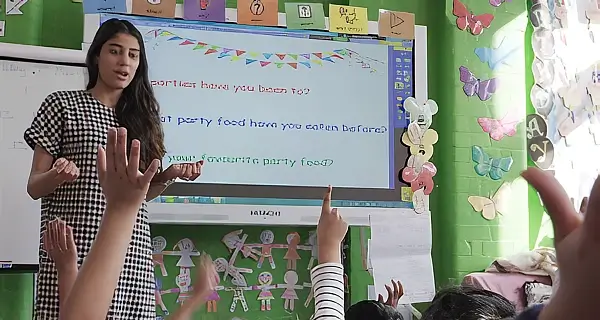Thousands of pupils in the UK are set to benefit from a £2 million investment aimed at boosting reading and writing skills, part of a broader effort to drive high and rising educational standards. This initiative seeks to break down barriers to opportunity by enhancing literacy programs across schools.
Literacy Boost Initiative
The UK government’s focus on improving literacy is part of a broader educational reform aimed at enhancing the quality of teaching and learning. This initiative aligns with the government’s ambition to ensure that by 2030, 90% of children leave primary school having achieved the expected standard in reading, writing, and maths—a significant increase from the current levels.
The emphasis on literacy is critical, as it forms the foundation for future academic success and lifelong learning. By investing in reading and writing programs, schools can better support students who may be struggling, thereby reducing educational disparities and promoting inclusivity.
This approach is also influenced by global perspectives on education, where literacy is recognized as a key factor in economic development and social mobility.
Context and Background
Historically, the UK has faced challenges in ensuring that all students meet the expected literacy standards. Pupils with special educational needs and disabilities (SEND) and those from disadvantaged backgrounds often face additional barriers to achieving these standards.
To address these challenges, the government is implementing various strategies, including teacher training programs and the creation of specialist educational facilities within mainstream schools.
These efforts are designed to provide targeted support, ensuring that every child has an equal opportunity to succeed academically.
Impact and Outcomes
Thousands of pupils will benefit from improved educational resources and teaching methods, boosting literacy significantly. Enhancing literacy skills equips students to succeed in other subjects and thrive beyond their school years.
Moreover, this initiative aligns with broader economic goals, as improving educational outcomes can lead to increased productivity and economic growth in the long term.
The success of such programs will be measured by improvements in literacy rates and overall academic achievement.
| Initiative | Objective | Expected Outcome |
|---|---|---|
| £2 Million Literacy Boost | Improve reading and writing skills | Enhanced educational outcomes for thousands of pupils |
| SEND Reforms | Increase inclusion in mainstream schools | Improved support for pupils with SEND |
| Levelling Up Mission | Achieve 90% literacy standard by 2030 | Significant economic benefits and social mobility |
Policy and Regulatory Shifts
The literacy boost initiative is part of a broader policy shift towards improving educational standards and inclusivity. Reforms create specialist places in mainstream schools, and educators receive training to support diverse learning needs.
Regulatory shifts, such as the introduction of new professional qualifications for SENCOs, will further support these efforts by enhancing the skills of educators working with children with SEND.
These changes reflect a commitment to evidence-based teaching practices and collaboration between schools and local communities.
Expert Insights and Strategic Challenges
While there is no specific expert quote available for this initiative, the strategic challenges include ensuring that the investment effectively reaches and supports the most vulnerable students. This requires careful planning and collaboration between schools, local authorities, and families.
Related Policies and Initiatives
- SEND Reforms: A £740 million investment to create specialist places in mainstream schools, enhancing support for pupils with SEND.
- Levelling Up Mission: Aims to achieve 90% of children meeting the expected literacy standard by 2030, with significant economic and social benefits.
- Teacher Training Programs: Providing 500,000 teacher training opportunities to improve teaching quality and support disadvantaged students.
Future Implications
The long-term implications of this literacy boost are substantial. By improving educational outcomes, the UK can enhance its economic competitiveness and social mobility. This initiative sets a precedent for future investments in education, emphasizing the importance of early intervention and targeted support for disadvantaged groups.
As the initiative progresses, it will be crucial to monitor its effectiveness and adapt strategies as needed to ensure that all students benefit from improved literacy programs.
This approach aligns with global trends in education, where literacy is increasingly recognized as a critical factor in achieving sustainable development goals.
What This Means for You
For families and educators, this initiative offers a promising opportunity to enhance educational experiences and outcomes.
It underscores the government’s commitment to ensuring that every child has access to quality education, regardless of their background or abilities.
Further Reading
Did You Know?
Only 20% of pupils with SEND met the expected standard in reading, writing, and maths at Key Stage 2 level last year, highlighting the need for targeted support like the literacy boost initiative.
Closing Thoughts
The literacy boost initiative is a significant step towards achieving high and rising educational standards in the UK. By focusing on literacy and inclusivity, the government aims to create a more equitable and effective education system.
This approach not only benefits individual students but also contributes to broader societal and economic goals.
As the initiative unfolds, it will be important to monitor its progress and adapt strategies to ensure that all students benefit from improved literacy programs. This includes ongoing investment in teacher training and the development of specialist educational facilities.
For those interested in learning more about educational reforms and initiatives, further resources are available through government publications and educational research organizations.








